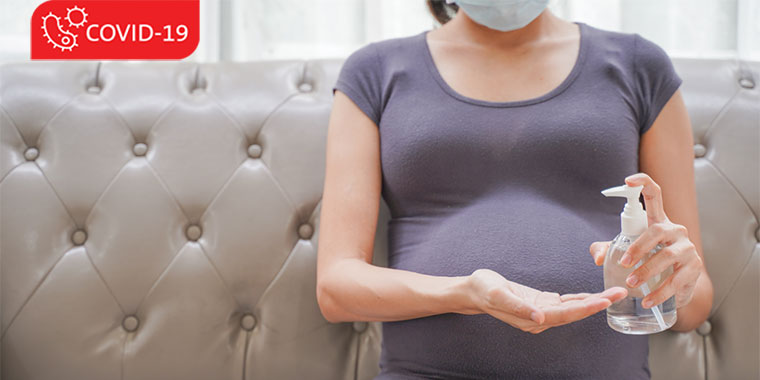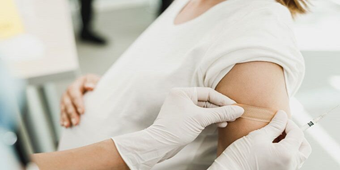Pregnant During COVID-19: Here’s What You Can Expect

Answer a few questions and we'll provide you with a list of primary care providers that best fit your needs.
We’re all understandably uneasy about COVID-19. But if you’re pregnant, you likely have an additional layer of concern. We asked David McKenna, MD with Perinatal Partners some of the questions we know you’re grappling with.
Is My Unborn Baby At Risk?
No, says Dr. McKenna. “At this point there is no evidence to suggest infants born to mothers with COVID-19 are at high risk for serious outcomes. That’s very reassuring.” Although there have been reported cases of infections in newborns born to mothers with COVID-19, it is unknown if the newborns got the virus prior or after birth, and most newborns had mild or no symptoms and recovered. The bigger concern, he explains, is mom passing the virus to her baby once the baby is born. “That’s why, if mom has the virus or is showing symptoms, special precautions are recommended to avoid transmission to your baby.”
A study in China of nine infants who tested positive for COVID-19 showed that while all were hospitalized, none required intensive care or mechanical ventilation or had any severe complications. All contracted the virus from an infected family member after birth.
Am I More Likely To Get COVID-19 If I’m Pregnant?
Maybe, says Dr. McKenna. “There’s always been a general pattern that pregnant women seem to be more susceptible to infections. That’s probably because mom’s immune system is depressed during pregnancy.” For this reason, the recommendation is that you follow the same self-protection recommendations as everyone else. “Also a seasonal influenza vaccination is recommended for all pregnant women. If you haven’t received one yet, please go now.”
Am I At Higher Risk Of Complications If I Get the Virus When Pregnant?
“As with many other viral infections, pregnant women tend to be at risk for more severe disease,” says Dr. McKenna. Pregnant women are at a small increased risk for intensive care unit (ICU) admission, mechanical ventilation, and death, compared to non-pregnant women, but the absolute increase is very small. In fact, the risk is much less than during the H1N (“swine flu”) influenza pandemic in 2009. He adds that it’s important to recognize that most people who get the virus don’t require hospitalization. And of those that are hospitalized, most don’t require a ventilator. Don’t panic, but do consult your obstetrician.
If you have COVID-19, you may be more likely to deliver before your due date. “That’s not because coronavirus causes premature births, but because your doctor may want you to deliver your baby sooner,” Dr. McKenna explains.
Can I Have a Support Person During And After Birth?
Currently at Premier Health hospitals, two support persons are permitted during labor, delivery. Both you and your support persons are expected to wear masks and observe personal protection protocols. A support person may visit until you are discharged. “But if a support person show any symptoms of COVID-19, they won’t be permitted in the hospital,” Dr. McKenna explains. “And if you show symptoms or test positive for COVID-19, you won’t be permitted a support person or visitor.” The rules are in place for the safety of mom, the baby, and the support person, says Dr. McKenna. He notes that rules are subject to change as the pandemic evolves.
How Are Pre- and Post-Delivery Visits With My Doctor Being Handled?
“All obstetricians are looking for ways to minimize face-to-face contact without diminishing the level of care they provide,” assures Dr. McKenna. “For example, we’re spacing out appointments and prescribing blood pressure cuffs for patients so they can monitor themselves and call in with results. And if mom has a Cesarean birth, we can arrange for her to securely send a picture or video of her incision scar two weeks postpartum so we can review during a phone call and avoid a face-to-face visit if possible.”
How Will I Be Protected At the Hospital?
“We’re following these guidelines recommended by numerous professional organizations,” says Dr. McKenna:
- All mothers admitted to the hospital are encouraged to have a COVID-19 test. If you’re coming in for a scheduled indication such as an induction of labor, your physician will order the test for you a few days prior to your scheduled date.
- Moms who arrive in labor, show no COVID-19 symptoms, and test negative will be placed in a room that is not located near someone with the virus.
- If you’re showing symptoms of COVID-19 upon arrival, or test positive, you’ll be isolated from healthy moms, as well as from other moms who have tested positive for COVID-19. This process is also true for patients with the flu, and is
intended to protect you and other moms. All staff will be wearing personal protective equipment.
Would a Home Birth Be Better?
“Absolutely not,” says Dr. McKenna. He suggests pregnant women consider this recent message from the American College of Obstetricians and Gynecologists (ACOG):
ACOG believes that the safest place for you to give birth is still a hospital, hospital-based birth center, or accredited freestanding birth center.
Even the healthiest pregnancies can have problems arise with little or no warning during labor and delivery. If problems happen, a hospital setting can give you and your baby the best care in a hurry. And studies have shown that babies born at home are more than twice as likely to die around the time of birth than those born in hospitals.
Every woman has the right to choose where she will give birth. But it is important to not take any risks that might put you or your newborn’s health in danger, especially while there is a high risk for getting COVID-19. Talk with your ob-gyn or other health care professional about your birth plan and any concerns.
Can I Breastfeed My Newborn?
“It is very unlikely that COVID-19 will be transmitted from an infected mother to her newborn in breast milk. You and your provider should discuss the
benefits of breastfeeding and the small risk of transmission, and make an informed choice,” Dr. McKenna says. “If you decide to breastfeed, there are precautions you may consider. Moms who have COVID-19 may want to express or pump milk, wear a mask, and practice additional hygienic measures.” Your providers will review these with you before you begin breastfeeding.
Answer a few questions and we'll provide you with a list of primary care providers that best fit your needs.
Source: David McKenna, MD, Perinatal Partners; American College of Obstetricians and Gynecologists; Journal of American Medical Association: Novel Coronavirus Infection in Hospitalized Infants Under 1 Year of Age in China





